|
|
|
Sort Order |
|
|
|
Items / Page
|
|
|
|
|
|
|
| Srl | Item |
| 1 |
ID:
120061
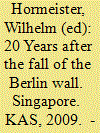

|
|
|
|
|
| Publication |
Singapore, KAS, 2009.
|
| Description |
147p.Pbk
|
| Series |
Panorama Insights into South East Asian and European Affairs
|
|
|
|
|
|
|
|
|
|
|
|
Copies: C:1/I:0,R:0,Q:0
Circulation
| Accession# | Call# | Current Location | Status | Policy | Location |
| 057218 | 943.087/HOR 057218 | Main | On Shelf | General | |
|
|
|
|
| 2 |
ID:
114990
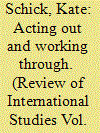

|
|
|
|
|
| Publication |
2011.
|
| Summary/Abstract |
Trauma, the silenced aftermath of violence, has been largely neglected by international security studies, which perceives trauma as having little relevance to global politics. However, this article contends that trauma profoundly influences global security. Unless traumatic events are worked through, they can heighten insecurity not only in the immediate aftermath of violence but decades and even generations later. The article is divided into three parts. The first section examines trauma in general terms, noting its individual, social and political dimensions. The second section examines acting out in response to trauma, with a particular focus on the meaning-making narratives adopted in order to make sense of traumatic experiences: the heroic soldier, good and evil, and redemptive violence. These narratives serve to secure the state by shutting down questioning and showing strength and decisiveness in the wake of traumatic shocks. Section three examines the notion of working through trauma. Working through involves a process of mourning, in which past atrocities are acknowledged, reflected on, and more fully understood in all their historically situated complexity. It is a deeply political process that struggles to understand and challenge those structures and practices that facilitate traumatic loss.
|
|
|
|
|
|
|
|
|
|
|
|
|
|
|
|
| 3 |
ID:
133845
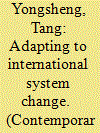

|
|
|
|
|
| Publication |
2014.
|
| Summary/Abstract |
Understanding the transition happening in the international system requires a balance between old logic and new reality. As the power pattern changes and the characteristics of international order unfold, the complications of global politics, casual relationships among different issues, and the echoing effects of strategic choices will lead to greater need for global governance. The logic of simple power politics will not be enough when strategists confront nontraditional challenges.
|
|
|
|
|
|
|
|
|
|
|
|
|
|
|
|
| 4 |
ID:
184894
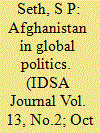

|
|
|
| 5 |
ID:
108517


|
|
|
|
|
| Publication |
2011.
|
| Summary/Abstract |
The article posits that in global politics, and in the scholarly subfield of international ethics, we should begin moving away from intentions and intentionality when considering accountability. Intentionality is problematic in at least three respects - analytically it is hard to determine; normatively it is difficult because we must invest our trust in authority; and it comes coupled with the problematic relationship between means and ends. This article explores these issues through three sections. First, it engages some of the purposes but also overall problems with 'intentions' in world politics (and especially the debate as it has progressed in the field of international ethics). The second section reviews recent theses on accountability, before moving towards an alternative aspect of accountability which already exists in world politics, termed in this article 'the accountability of the scar'. This last form of accountability refers to the physical damage produced by violence, with reference to three domains - the anthrobiological, the architectural, and the agentic sphere. Two examples of the scar come to us from the different context of the Emmett Till case of 1955 and the more fluid, and recent case of Iranian protestor Neda Agha-Soltan.
|
|
|
|
|
|
|
|
|
|
|
|
|
|
|
|
| 6 |
ID:
109521
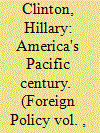

|
|
|
| 7 |
ID:
092298
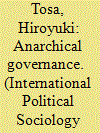

|
|
|
|
|
| Publication |
2009.
|
| Summary/Abstract |
Beside the promotion of a politics of inclusion, implemented by governing at a distance, the global governmentality also promotes a politics of exclusion, such as establishing targeted governance that is aimed at deviant groups at the periphery of global politics. This highly disciplinary social control that is imposed upon the marginalized population sometimes leads to instances of the state of exception, in which people are forced to endure "bare lives." This kind of exception existing at the marginalized periphery of the neoliberal global governmentality becomes normal. This neoliberal governmentality creates an informal sector of an enormous scale, whose spatial representation is the global slum, and where vicious cycles of violence become normal.
|
|
|
|
|
|
|
|
|
|
|
|
|
|
|
|
| 8 |
ID:
166758
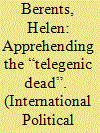

|
|
|
|
|
| Summary/Abstract |
Images of suffering children have long been used to illustrate the violence and horror of conflict. In recent years, it is images of dead children that have garnered attention from media audiences around the world. In response to the deaths of four children killed by the Israeli army while playing on a Gazan beach, Israeli Prime Minister Netenyahu accused Hamas of generating “telegenically dead” Palestinian children for their cause (CNN 2014). In this article, it argues with this term to consider the appearance of images of dead children in global politics. I draw on a growing literature relating to the corpse as a subject in international relations (IR), asking how children's bodies are understood, following Butler, as “grievable lives.” It explores the notion of “iconic” images and the politics of sharing images of dead bodies and consider global power relations that allow certain children's deaths to be visible and not others. Through this analysis, the article argues that the idea of telegenic death might be productively considered to understand how the fleshy reality of children's deaths contribute to discussions about the representation and visibility of children in contexts of crisis and conflict.
|
|
|
|
|
|
|
|
|
|
|
|
|
|
|
|
| 9 |
ID:
146710
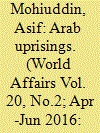

|
|
|
|
|
| Contents |
This article points out that the watershed events that initiated the period of contentious politics in the Arab world after 2010 not only reshaped regional and global politics but also challenged state power and long held theories dominant in the region, particularly about the popular acquiescence to regime control. They opened new areas of inquiry as well. By their impact on regional and international politics, these events have drawn the attention of scholars across the world. Some argue that these changes occurred as a result of the globalisation of democratic norms, new media technologies and regional structural changes, which led to widespread demonstrations, both violent and nonviolent. In calling for the downfall of the entrenched regimes, they signalled a breakdown of the social contract that had existed between the people and their rulers since independence.
|
|
|
|
|
|
|
|
|
|
|
|
|
|
|
|
| 10 |
ID:
111040
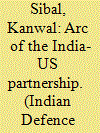

|
|
|
| 11 |
ID:
130322
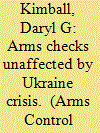

|
|
|
|
|
| Publication |
2014.
|
| Summary/Abstract |
Although the widening confrontation over the political future of the Crimean peninsula and other parts of the former Soviet Union has ruptured already-strained relations between Moscow and the West and put at risk the implementation of some nuclear risk-reduction initiatives and agreements, Russia is not planning to stop allowing the on-site inspections required under the 2010 New Strategic Arms Reduction Treaty (New START), Russian officials said last month. To protest Russia's actions to take control of Crimea, the seven non-Russian members of the Group of Eight (G-8) industrialized countries have suspended Russia's membership in the group. As part of that decision, the seven countries-Canada, Italy, France, Germany, Japan, the United Kingdom, and the United States-changed the location of their planned June summit from Sochi to Brussels. The Russian actions in Crimea have disrupted planning for the activities of the Global Partnership against the Spread of Weapons and Materials of Mass Destruction, which the G-8 launched in 2002.
|
|
|
|
|
|
|
|
|
|
|
|
|
|
|
|
| 12 |
ID:
130356
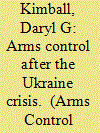

|
|
|
|
|
| Publication |
2014.
|
| Summary/Abstract |
The Global Nuclear Disarmament and risk reduction enterprise is at a crossroads as U.S.-Russian relations have reached perhaps their lowest point in more than a quarter century. Nevertheless, it remains in U.S. and Russian interests to implement existing nuclear risk reduction agreements and pursue practical, low-risk steps to lower tensions. Present circumstances demand new approaches to resolve stubborn challenges to deeper nuclear cuts and the establishment of a new framework to address Euro-Atlantic security issues.
Even before the recent political turmoil in Ukraine and Russian President Vladimir Putin's extralegal occupation and annexation of Crimea, relations between Moscow and Washington were chilly. Despite U.S. adjustments to its missile defense plans in Europe that eliminate any threat to Russian strategic missiles, Putin rebuffed U.S. President Barack Obama's proposal last June to reduce U.S. and Russian strategic stockpiles by one-third below the ceilings set by the New Strategic Arms Reduction Treaty (New START).
Moving forward will be difficult, but doing nothing is not an option. Through earlier crises during and after the Cold War, U.S. and Russian leaders pursued effective arms control and disarmament initiatives that increased mutual security and significantly reduced the nuclear danger. Much has been achieved, albeit too slowly, but there is far more to be done.
As the world's non-nuclear-weapon states persuasively argue, U.S. and Russian stockpiles still far exceed any plausible deterrence requirements, and the use of just a few nuclear weapons by any country would have catastrophic global consequences. As the 2015 Nuclear Nonproliferation Treaty (NPT) Review Conference approaches, pressure to accelerate action on disarmament will only grow.
For now, neither Russia nor the United States wants to scrap the existing arms control regime, including New START and the Intermediate-Range Nuclear Forces (INF) Treaty, which provide greater predictability and stability in an otherwise strained bilateral relationship. A return to a period of unconstrained strategic nuclear competition would not only deepen the distrust and increase dangers for both sides, but also would undermine the NPT. Scrapping the existing nuclear risk reduction measures would do nothing to protect Ukraine from further Russian aggression or reassure nervous NATO allies.
Unfortunately, the profound tensions over Ukraine delay the possibility of any formal, bilateral talks on nuclear arms reductions and missile defense. In light of these realities, Obama and other key leaders must explore alternative options to reduce global nuclear dangers and defuse U.S.-Russian strategic tensions.
|
|
|
|
|
|
|
|
|
|
|
|
|
|
|
|
| 13 |
ID:
100703
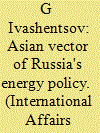

|
|
|
|
|
| Publication |
2010.
|
| Summary/Abstract |
IN NOVEMBER 2009, the Russian government approved The Russian Energy Strategy through 2030. In a situation where the struggle for energy resources has become probably the prime motive force of global politics, the path of development followed by the Russian energy industry in the next 20 years will to a very large degree predetermine the future of our country and its place in the system of international relations.
|
|
|
|
|
|
|
|
|
|
|
|
|
|
|
|
| 14 |
ID:
100322
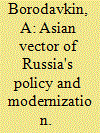

|
|
|
|
|
| Publication |
2010.
|
| Summary/Abstract |
International Affairs": We all know that the APR is developing into another power center as a hub of global economic development with a much greater impact on global politics. What are the main factors behinds its balanced development and what is Russia's role in these processes?
Aleksey Borodavkin, Deputy Foreign Minister of Russia: In recent years, the center of global economic development and political interaction has shifted to the APR where the East Asian export-oriented economies, though hit, together with the rest of the world, by adverse conjuncture, suffered much less of the global financial and economic crisis than Europe and America. The region has retained its role of a driving force of world economy; the national economies are much closer intertwined than before which adds vigor to regional economic integration and stirs up centripetal trends behind the polycentric regional order which is taking shape before our eyes.
Russia, Siberia and the Far East in the first place, should capitalize on its geographical proximity to the rapidly rising region to embrace the innovation development patterns and modernize its economy. The meeting chaired by President Medvedev which took place in Khabarovsk on 2 July 2010 arrived precisely at this conclusion.
From the 18th century onwards, Russia realized itself as a great power stretching from the Atlantic to the Pacific and a progressive civi-lizational project. Our past suggests that we should clarify the priorities to be able to join concrete political and economic projects to the advantage of our people.
|
|
|
|
|
|
|
|
|
|
|
|
|
|
|
|
| 15 |
ID:
137357
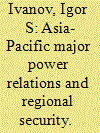

|
|
|
|
|
| Summary/Abstract |
Let me start my presentation with saying how privileged and honored I feel for having a chance to be here, at the Tsinghua University once again. Considering myself to be a veteran of the World Peace Forum, I have to say that over last years the Forum emerged as one of the most prestigious and representative meeting points for security related discussions in the Asia-Pacific region. In many ways, it is a unique opportunity for experts, educators, opinion makers and state officials of our large and diverse region to get together and to exchange views on critical issues of the past, present and future.
|
|
|
|
|
|
|
|
|
|
|
|
|
|
|
|
| 16 |
ID:
128615
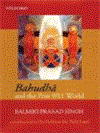

|
|
|
|
|
| Publication |
New Delhi, Oxford University Press, 2008.
|
| Description |
xxii, 370p.Hbk
|
| Standard Number |
9780195693553
|
|
|
|
|
|
|
|
|
|
|
|
Copies: C:1/I:0,R:0,Q:0
Circulation
| Accession# | Call# | Current Location | Status | Policy | Location |
| 057621 | 909/SIN 057621 | Main | On Shelf | General | |
|
|
|
|
| 17 |
ID:
113353
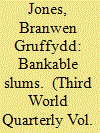

|
|
|
|
|
| Publication |
2012.
|
| Summary/Abstract |
This article develops a critical analysis of the Slum Upgrading Facility, a new initiative of UN-Habitat which seeks to improve conditions for residents of slums in Africa and elsewhere. The analysis highlights the neoliberal principles underpinning this initiative, and especially the vision of slum improvement by means of financialisation. The article argues that it is necessary and important to recognise the politics of international urban development and housing, which has since the 1970s increasingly emphasised neoliberal principles of private property and market institutions. The novel ambition of financialisation must also be situated in relation to historical transformations of housing finance in Anglo-American capitalism over the past three decades. After situating the ideological principles underpinning the Slum Upgrading Facility in these longer and broader global trajectories of international policy, the final section returns to the present to examine other initiatives currently being pursued alongside slum upgrading: the active promotion of mortgage markets in Africa.
|
|
|
|
|
|
|
|
|
|
|
|
|
|
|
|
| 18 |
ID:
129527
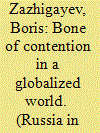

|
|
|
|
|
| Publication |
2014.
|
| Summary/Abstract |
In the context of the twenty-first-century globalized world, Ukraine is destined to play a pivotal role as the junction of civilizations, precisely in the same manner the country did numerous times in the past. Such a role largely determines Ukraine's geopolitical status as a buffer territory, in which conflicts play out between branches of Christianity and European and Asian cultures. In the twenty-first century, controlling Ukrainian territory has become extremely critical. In contrast to past events, this control has acquired a new and far greater geopolitical significance.
|
|
|
|
|
|
|
|
|
|
|
|
|
|
|
|
| 19 |
ID:
094592
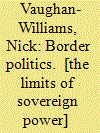

|
|
|
|
|
| Publication |
Edinburgh, Edinburgh Unitversity Press, 2009.
|
| Description |
ix, 190p.
|
| Standard Number |
9780748637324
|
|
|
|
|
|
|
|
|
|
|
|
Copies: C:1/I:0,R:0,Q:0
Circulation
| Accession# | Call# | Current Location | Status | Policy | Location |
| 054844 | 320.12/VAU 054844 | Main | On Shelf | General | |
|
|
|
|
| 20 |
ID:
174230
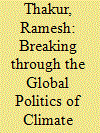

|
|
|
|
|
| Summary/Abstract |
In preparation for the UN discussions in September and the Madrid climate conference in December, a spate of reports warned that the natural environment and ecological systems that sustain all forms of life are collapsing. 1 Laurie Laybourn-Langton, lead author of a report from the Institute for Public Policy Research (IPPR) in February 2019, wrote that “the environment is breaking down, with consequences which include more drought, famine, forced migration and war. Environmental breakdown poses a catastrophic risk.”
|
|
|
|
|
|
|
|
|
|
|
|
|
|
|
|
|
|
|
|
|